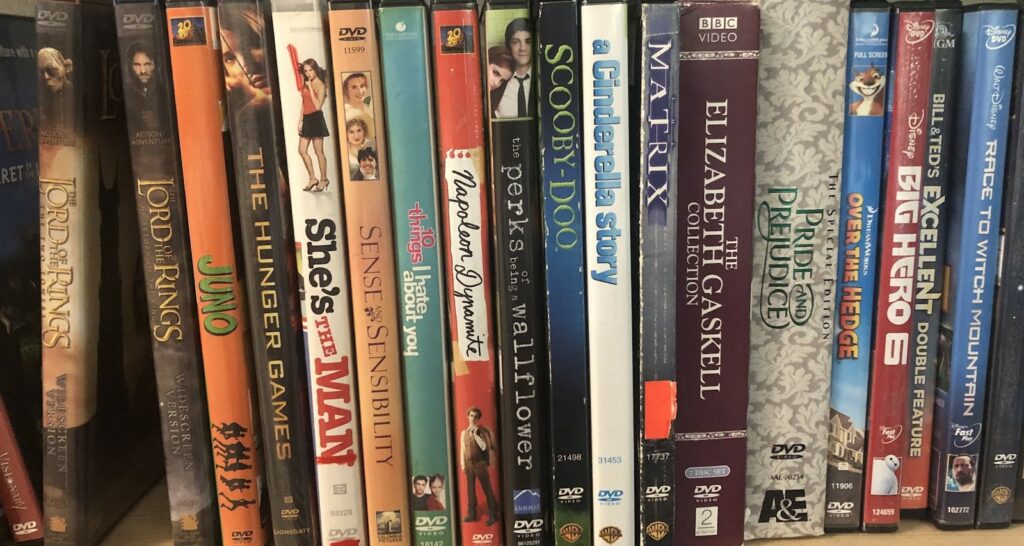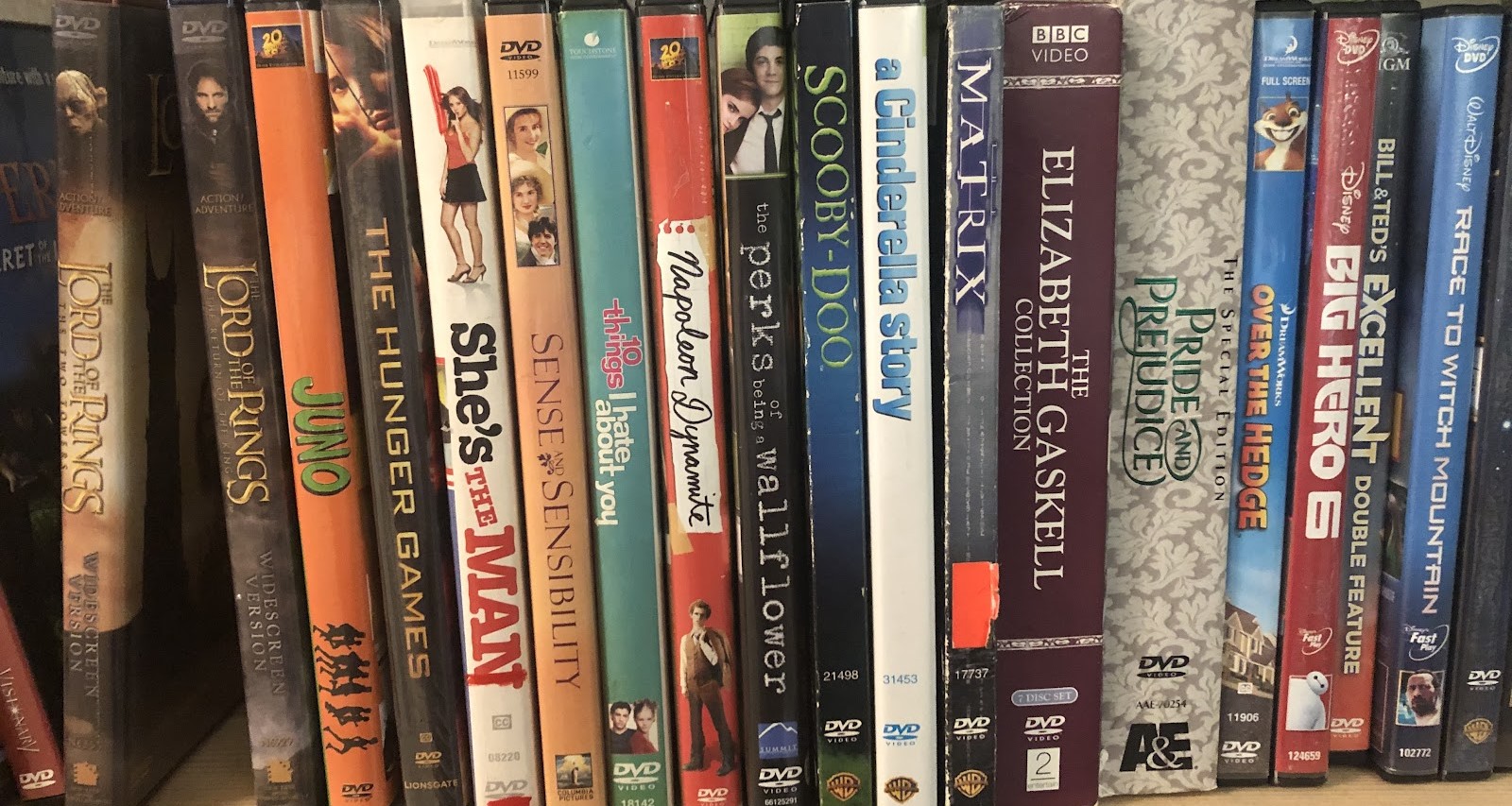And No, Not just Vinyl
I’m just barely old enough to remember when Netflix was a DVD-rental service through the mail, and if you wanted to listen to music in your car you had a giant binder of CDs to flip through. Before streaming services and the ability to find literally anything in the world on the internet, the only way to consume media other than going to the movie theater or listening to the radio meant you had to have a physical copy of it.
I’m sure some of you are old enough to be rolling your eyes at me talking about this like it’s ancient times, but it is a bygone era – and one I barely experienced. By the time I was in highschool, physical media was something of a thing of the past, and the older I’ve gotten, the more so it’s become. I mean, half my textbooks are only available online through Inclusive Access, and the bookstore doesn’t even carry textbooks: they have to be ordered online.
However, I don’t think this is necessarily a good thing. Digital media is awesome, and the fact that the internet has made things so much more accessible is wonderful. But, it does have its flaws – which is why I’ve been spending a lot of time recently in second hand stores, picking up my favorite movies on DVD and actual CDs of my favorite music.
I’ve found that having physical copies of things makes them way more meaningful. Songs are no longer a title on a screen I can skip or delete or add to a playlist at will on Spotify – they’re tracks on a disc I have to hold in my hands and put inside a boom box.
Instead of scrolling through a list of 100+ movies on Netflix, when I have to find a DVD to put in or borrow it from the library, I’m a lot more present and focused on what I’m watching. It’s not a tab I can just click out of, it’s a piece of art I had to get a hold of in order to consume. Our attention spans are getting shorter and shorter as social media and the immediacy of the internet chip away at our ability to focus on long-form art.
According to the National Centre for Biotechnology Information, the average person’s attention span in the year 2000 was 12 seconds. In 2022, however, it had dropped to 8.25 seconds: due in part to the increasing usage of the internet. Social media is designed to show us as much information as possible as quickly as possible, making us want to keep on scrolling. This wears down our ability to focus on one thing for a long period of time, and makes our brains require more and more stimulation at once to release chemicals like dopamine.
In the internet age of constant distraction and instant gratification, it’s easy to see everything as disposable. I can close the window on my laptop and the script of Hamlet is gone – I don’t have to put it back on my bookshelf and carry it with me every new place I move. But when I have a play in my hands, it suddenly becomes real and tangible in a way that ebooks just can’t. The text becomes a text, a piece of art outside of myself or my head, not something I can pull up or dismiss at will on a screen. I like being able to hold the things I love in my hands, stack them on my shelves, and flip through them to pick something.

Plus, it can get dangerous relying on streaming services for everything. We take the internet for granted, as well as having access to the internet. Putting music on an MP3 player is still a physical copy you can carry around, but a Spotify subscription is nothing if you can’t access wifi, unless you’ve downloaded all your music – something the modern smartphone’s memory is not designed for. This makes it really easy to lose everything in one fell swoop.
Last week I took my phone in to get the screen replaced, and they somehow destroyed the battery in the process. No, I don’t know how they did it, and yes, it is impressively hard to damage a battery while working on a screen. But either way, this left me phoneless for a day while I waited for the repair shop to open again the next afternoon and then actually fix the battery.
I very quickly became aware of what I could and could not do without my phone. Listening to music in my car was limited to the CDs I owned, and I would have needed an MP3 player or Walkman to listen to music walking around or on the bus. I no longer had access to the books I was reading on my phone, and it didn’t matter how many shows I’d downloaded to my Prime Video app – I could only get to it on my phone. The obvious issue of not having a way to contact people aside, I was suddenly very glad I’d been collecting CDs this month.
I’m a picky person, I’ll admit it, and I kind of hate having the soundtrack for my drive be at the mercy of the radio’s whims. I’m a college kid. I like having the things I’m used to, and I’m used to being able to choose my own music.
Plus, in December of 2022, HBO Max deleted a bunch of shows from their streaming service as a tax write-off. This was the only place you could access a lot of shows other than having a physical copy, and a couple things had never been released physically and are now lost media unless someone pirated it before they went away. For example, the last season of Final Space is just gone. There was no DVD release and HBO Max pulled it – the work of so many artists, just wiped away. The only way to watch Final Space now is to have already purchased DVD copies of it, or somehow get your hands on a DVD now.
Having access to media be subject to the whims of company executives is not a good thing. I don’t want my ability to ever read my favorite book again be something a money-grubbing CEO can just take away.
And finally, not to sound like my apocalypse-prepper relatives, but I think I would lose my mind if something happened where wifi wasn’t everywhere anymore and I couldn’t access anything. Books, music, movies – if everything I had was on a streaming service, the zombies would not be the first thing to get me. It would be not being able to listen to music.
So collect physical media! It’s fun to have a collection of CDs with their booklets and album art, and DVDs with all the bonus content right on them instead of having to pay extra. It makes you more aware of the art you have access to, and makes consuming it that much more meaningful.
You’re not letting businessmen you’ll never meet make the choice of what you can and can’t watch. You’re no longer at the risk of losing your entire library if you can’t afford a subscription anymore, and – most importantly – if aliens come for us all, at least you’ll be able to watch the sun explode while listening to your favorite songs.
